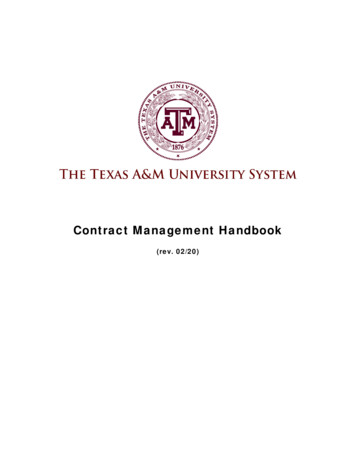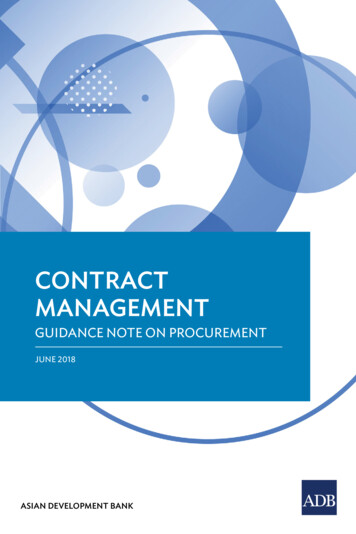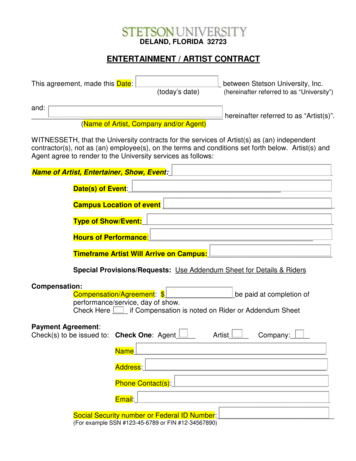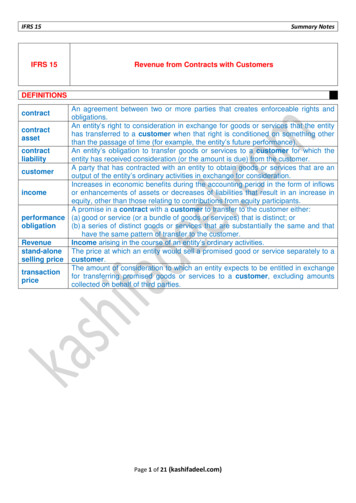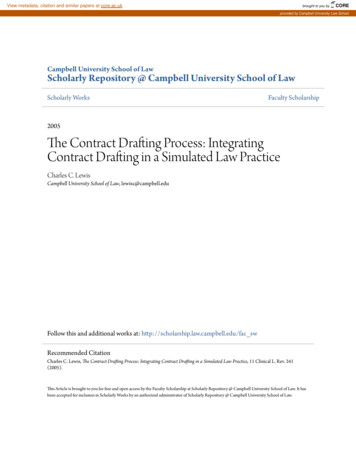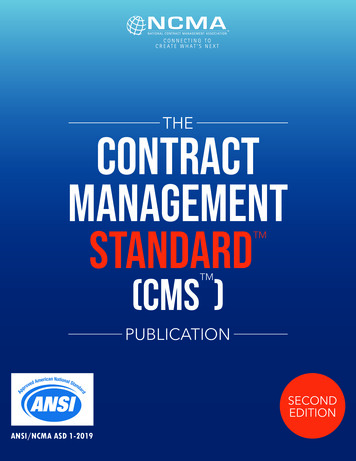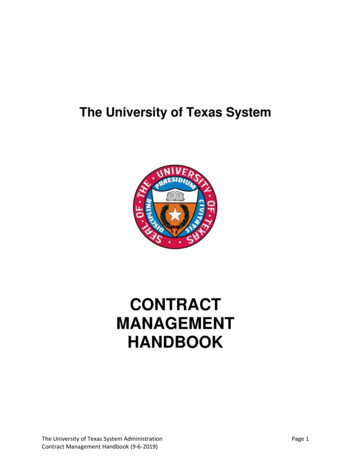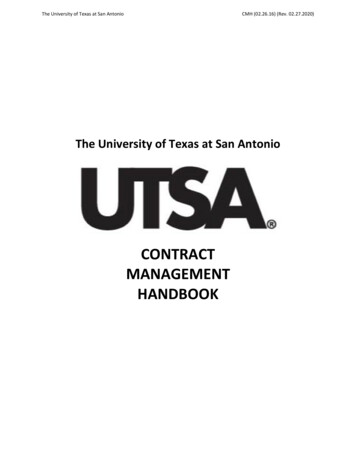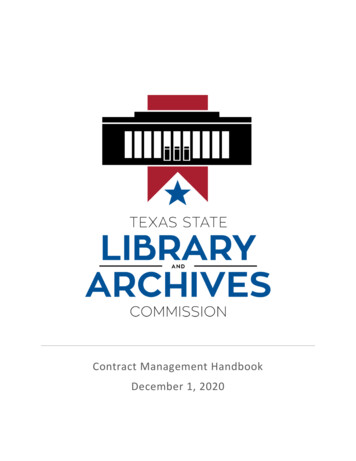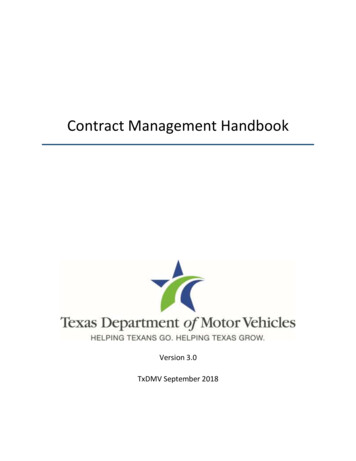
Transcription
Contract Management HandbookVersion 3.0TxDMV September 2018
TABLE OF CONTENTSREVISION HISTORY . 31Introduction . 42Definitions . 43Purchasing Section Organization . 44State and Agency Ethical Standards. 54.1Conflict of Interest . 54.2Disclosure . 64.3Required Forms . 65State Procurement and Contracting Statute and Rules . 76TxDMV Board Approval Requirements . 87Need Assessment . 98Approvals and Signature Authority . 99Enhanced Contract Monitoring Program . 109.1Risk Assessment Worksheet . 109.2Enhanced Guidance for Contracts over 1 million . 109.3Enhanced Guidance for Contracts or Solicitations over 5 million . 1110Contract Management . 1110.1Contract Monitoring . 1110.2TxDMV Major Contracts/Purchase Orders . 1110.3Contract Change Control. 1210.4Contract Issue/Risk Management . 1210.5Contract Disputes. 1310.6Contract/Purchase Files . 1410.7Posting Contracts/POs and Contract/PO Documents . 1411Contract Management Roles . 1411.1Contract Monitor . 1511.2Contract Administrator . 1711.3Office of General Counsel (OGC). 1911.4Other Contract Stakeholders . 19Contract Management HandbookPage 2 of 20September 2018
REVISION HISTORYVersionDateDescription3.09/1/2018Original ReleaseContract Management HandbookPage 3 of 20September 2018
1 IntroductionThe 84th Texas Legislature in 2015 amended Texas Government Code Chapter 2261, State ContractingStandards and Oversight, to require:“Each state agency shall publish a contract management handbook that establishesconsistent contracting policies and practices to be followed by the agency and that isconsistent with the comptroller’s contract management guide. The agency’s handbookmay include standard contract provisions and formats for the agency to incorporate incontracts.”The Texas Department of Motor Vehicles (TxDMV) Contract Management Handbook (CMH) wasdeveloped by TxDMV employees from the Finance and Administrative Services Division (FAS), EnterpriseProject Management Office (EPMO), Information Technology Services Division (ITSD) and the Office ofGeneral Counsel (OGC) in consultation with Internal Audit Division (IAD). The intent of the handbook isto establish consistent contract management policies and procedures for TxDMV employees involved inprocuring and management of contracts.The CMH is not intended to cover all requirements or issues, and is to be applied in conjunction withapplicable TxDMV policies, state and federal statutes, laws, rules, policies, and best practices.Any suggestions should be directed to the Director of Purchasing or the Purchasing & ContractCoordinator.2 Definitions Board Members – The body of appointed members who jointly oversee the activities of TxDMV. Best Value – Factors to be considered in determining lowest overall cost and value in makingcertain purchases. Contractors – Non-TxDMV employees who have been hired to perform specific tasks. Contract Monitor – Individual(s) assigned to manage or oversee a purchase order or contract. Contract Administrator – An individual in the FAS Division, Purchasing Section who conducts theprocurement process. Executive Sponsor – A senior executive that supports a project’s viability and defensibility froman agency perspective. This role is responsible for overseeing a project.3 Purchasing Section OrganizationThe Purchasing Section is responsible for overseeing, coordinating, facilitating, and managing allprocurement and contracting related activities for all TxDMV offices. Purchasing staff are available toassist TxDMV employees with procurement and contracting related questions. Purchasing’s efforts arefocused on the procurement and contracting activities to obtain the best value for the agency.Contract Management HandbookPage 4 of 20September 2018
Purchasing employs certified staff that assist, review, recommend, approve, and record procurements ofgoods and/or services in accordance with statute, law, regulations and internal policies.4 State and Agency Ethical StandardsTxDMV employees, Board Members and Contractors participating in procurement and contractingprocesses are subject to a high standard of ethics, and must adhere to TxDMV ethics policies, as set forthin the TxDMV Human Resources Manual. Those that violate these standards are subject to disciplinaryaction, as described in the TxDMV Human Resources Manual.TxDMV employees, Board Members and Contractors participating in the procurement and contractingprocesses are responsible for ensuring the proper disposition of public funds. TxDMV employees, BoardMembers and Contractors must avoid acts that are improper or give the appearance of impropriety, as itrelates to the procurement and contracting process.The appearance of impropriety may be defined as the absence of circumstances that would cause areasonable and informed third party, having knowledge of the relevant information, to reasonablyconclude that the integrity or objectivity of a TxDMV employee, Board Member or Contractor has beencompromised.State personnel must adhere to the highest level of professionalism in performing their official duties.Employees of agencies who perform procurement functions are required (34 Texas Administrative Code§20.157) to adhere to the same ethical standards required of the Comptroller of Public Accounts (CPA)employees:“State officials and state employees are entrusted with the safety and welfare of thecitizens of Texas. In return for their confidence in state government, citizens expect thatstate employees’ private interests will not conflict with public business. The nature ofpurchasing functions makes it critical that all participants in the process remainindependent, free of obligation or suspicion, and completely fair and impartial.Maintaining the integrity and credibility of a purchasing program requires a clear set ofguidelines, rules and responsibilities to govern the behavior of purchasing employees.Credibility and public confidence are vital throughout the purchasing and contractingsystem.”The CPA’s State of Texas Procurement Manual, Section 1.24.1Conflict of InterestTxDMV employees, Board Members and Contractors are prohibited under Texas Government Code§572.051 and Texas Government Code §2155.003 from having an interest in or receiving benefitsfrom a contract or bid for a purchase of goods and/or services. Perception plays a key role inmaintaining the highest level of integrity, which includes avoiding the appearance of impropriety.“It is the policy of the State of Texas that a state officer or state employee may not have adirect or indirect interest, including financial and other interests, or engage in a businesstransaction or professional activity, or incur any obligation of any nature that is inContract Management HandbookPage 5 of 20September 2018
substantial conflict with the proper discharge of the officer’s or employee’s duties in thepublic interest.”Government Code 572.0014.2DisclosureUnder Texas Government Code §2261.252, each state agency employee or official who is involvedin procurement or in contract management for a state agency must disclose to the agency anypotential conflict of interest specified by state law or agency policy that is known by the employeeor official with respect to any contract with a private vendor or bid for purchase of goods or servicesfrom a private vendor by the agency.A state agency may not enter into a contract for the purchase of goods and/or services with a vendorwith whom any of the following agency employees or officials has a financial interest: A member of the agency’s governing body; The Governing Official, Executive Director, General Counsel, Chief Purchasing Officer orPurchasing Director of the agency; A family member related to an employee or officials described above within the seconddegree by affinity or consanguinity; Having a “financial interest” in this section is defined as a state agency employee or officialthat:1. Owns or controls, directly or indirectly, an ownership interest of at least 1% in theperson including the right to share in profits, proceeds, or capital gains, or;2. Could foresee that a contract with a person could result in a financial benefit tothe employee or official. A financial interest prohibited by this section does not include a retirement plan, a blindtrust, insurance coverage, or an ownership interest of less than 1% in a corporation.Under Texas Government Code §572.069, state officers and employees who participate in aprocurement or contract negotiation are prohibited from accepting employment with a vendor for2 years after the officer’s or employee’s service or employment with the agency have ceased.TxDMV has extended these requirements to include contractors.4.3Required FormsAll TxDMV employees, Board Members and Contractors involved in procurement or contractmanagement activities must disclose to the agency any conflict of interest with respect to anycontract with a vendor or bid for the purchase of goods and/or services. A Non-Disclosure andConflict of Interest form (PUR-014) will be provided by the responsible purchaser and must be signedby any employee who participates in the development of a specification, solicitation document(s),evaluation, negotiation, or contract monitoring activities. Those that violate this provision aresubject to discipline, in accordance with the TxDMV Human Resources Manual. Contract MonitorsContract Management HandbookPage 6 of 20September 2018
will be required to sign a Non-Disclosure and Conflict of Interest form once assigned to a contract ormajor purchase order. TxDMV employees, Board Members and Contractors are responsible forimmediately reporting a potential conflict of interest if identified at any time during the year to theassigned Purchaser.Under Texas Government Code §2262.004, TxDMV employees, Board Members and Contractorsinvolved in the specification development or an award determination must sign a State Auditor’sOffice State Agency Uniform Nepotism Disclosure form before a state agency may award a majorcontract (a contract with a value of 1 million or more) for the purchase of goods and/or services toa business entity.Each TxDMV employee, Board Member and Contractor involved in procuring or managing a contractmust disclose in writing any financial interest in the prospective vendor. The agency may not enterinto a contract if a covered employee, Board Member or Contractor or any of their family memberswithin a degree described by Texas Government Code §573.002 has a financial interest. For anyprospective vendor or business entity for contracts valued more than 25,000, and TxDMV employeeor Board Member regardless if authority to execute has been delegated to the Executive Directorwho has a relationship with an employee, a partner, a major stockholder, or a paid consultant of thatentity must also report that relationship. This is documented by using the Employee/OfficialDisclosure Statement form (PUR-015) which will be provided by the responsible purchaser.Texas Government Code §2252.908 prohibits agencies from entering into contracts over 1 millionor contracts that require action by the government body without submitting a Disclosure ofInterested Parties Form (Texas Ethics Commission form 1295.) Before fully executing a contractvalued at 1 million or more, TxDMV must obtain a copy of the Disclosure of Interested Parties formfrom the proposed business entity (vendor). TxDMV Purchasing must include the form with theprocurement file and the vendor must submit the form to the Texas Ethics Commission within 30days of receipt of the disclosure.A Major Contract/Purchase Order is defined as: A Contract/Purchase Order with a “High” or “Important” risk classification based on theoutcome from use of the Risk Assessment Worksheet; The total value of the Contract/Purchase Order not including optional renewals, is 200,000 or more; A Contract/Purchase Order for Temporary Personnel; or The Contract/Purchase Order is based on a Time and Materials fee payment structure.5 State Procurement and Contracting Statute and RulesBelow is a list of procurement statutes, rules, manuals, and guides that the CPA provides on their website.All procurements and/or contracts must adhere to the following: documents. Governing statutes and rules:Contract Management HandbookPage 7 of 20September 2018
s.html The State of Texas Procurement b/manual/ and; The Contract Management /contractguide/6 TxDMV Board Approval RequirementsProposed procurements, contracts or agreements with a value of 200,000 or more require TxDMV Boardapproval unless specifically excluded through the “Contract Approval Procedures. Specific exclusions are: Grants or contracts which do not obligate the department to pay; Statewide Procurement Division (SPD) contracts; Department of Information Resources (DIR) contracts; Council on Competitive Government (CCG) contracts; Hardware/software maintenance; Vehicle registration renewal notices; Vehicle titles; Interagency/Inter-local agreements1; Texas Multiple Award Schedule (TXMAS) contracts2; Registration stickers Equipment maintenance; Temporary staff services; Lawn services; Janitorial services; Vehicles; Leased copiers; Copier maintenance; Trash disposal; Software – “off-the-shelf”; Set-aside contracts3; and Postage.Contract Management HandbookPage 8 of 20September 2018
1However, the interagency contract between TxDMV and the Texas Department ofTransportation (TxDOT) pursuant to House Bill 3097 from the 81st Regular Legislative Sessionand/or Senate Bill 1420 from the 82nd Regular Legislative Session is excluded from this exclusion.The department must obtain Board approval for this contract prior to execution of suchcontract, to the extent the dollar amount triggers the requirement for Board approval.2Texas Multiple Award Schedule (TXMAS) contracts are contracts that have been developed fromcontracts awarded by the federal government or any other governmental entity of any state.3Set-aside contracts are a specific set of contracts for which a competitive procurement is notrequired, such as contracts for commodities or services that are available from TexasCorrectional Industries (TCI) and any central nonprofit agency under contract with the TexasWorkforce Commission (TWC). Currently, TIBH Industries (TIBH), Inc. is the only centralnonprofit agency under contract with the Commission.7 Need AssessmentThe requesting Division is responsible for completing a Need Assessment Form (PUR-010) and obtainingapproval from the Executive Director, or their designee, for all procurements that are equal to or exceed 200,000, or all procurements of temporary personnel of any value for the term of the procurement priorto the submission of a requisition in Centralized Accounting and Payroll/Personnel System (CAPPS). A copyof the approved Need Assessment Form (PUR-010) must be submitted along with the requisition andretained in the procurement file. The Division should retain the original.8 Approvals and Signature AuthorityAll requisitions for goods and/or services must be submitted and approved through the CentralizedAccounting and Payroll/Personnel System (CAPPS). TxDMV has established dollar thresholds designatingmanagement level approval for requisitions: No more than 500.00 – Lead Worker/Team Lead No more than 4,999.99 – Section Manager No more than 99,999.99 – Division Director/Deputy Division Director 100,000 or more - Division Director, Chief Financial Officer or Assistant Chief Financial Officerand Executive Director or Deputy Executive Director (unless delegated.)Only the Executive Director or Deputy Executive Director (unless delegated) may execute a contract oramendment that expends funds.Only certified purchasers within the FAS Division Purchasing Section may execute purchase orders orpurchase order change notices within approved dollar thresholds that expend appropriated funds.No other TxDMV employee may sign a contract or purchase order binding the agency without a delegationof authority to do so.Contract Management HandbookPage 9 of 20September 2018
9 Enhanced Contract Monitoring ProgramTexas Government Code §2261.253 requires each state agency by rule to establish a procedure to identifyeach contract that requires enhanced contract or performance monitoring and submit documentation ofpossible contract risks identified to the agency governing body. The Chief Financial Officer or Director ofPurchasing shall immediately notify the department’s governing body of any serious issue or risk that isidentified with respect to a contract monitored under this section.Under 43 TAC Section 210.3, TxDMV has established rules to apply risk assessment factors to agencycontracts/purchase orders as defined in Texas Government Code §2261.253. TxDMV staff must considerthe following factors when assessing risk: Dollar amount of contract/purchase order; Total contract/purchase order duration; Vendor past performance; Risk of fraud, abuse or waste; Business process impact due to failure or delay; and Board or Executive Director’s request for enhanced contract or performance monitoring.9.1Risk Assessment WorksheetAll procurements with a value of 200,000 or greater require a completed “Risk AssessmentWorksheet form” (PUR-016) which will be provided by the responsible purchaser at the time ofaward of the purchase order/contract. Analysis is to be completed, at a minimum, by the requestingDivision Director (or designee) and the assigned Contract Monitor, in coordination with otherappropriate personnel, with approval of the responsible Division Director. The original completedRisk Assessment Worksheet form shall be sent to the Director of Purchasing.At the discretion of the Contract Monitor, in coordination with other appropriate personnel, withapproval of the responsible Division Director, procurements less than 200,000 may also besubjected to risk assessment analysis.9.2Enhanced Guidance for Contracts over 1 millionUnder Texas Government Code §2261.254, for all contracts over 1 million, the agency shall developand implement contract reporting requirements that provide information on: Compliance with financial provisions and delivery schedules; Corrective action plans required under the contract and the status of those plans; and Any liquidated damages assessed or collected under the contract or purchase order.In accordance with Section 7.12 of the General Appropriations Acts, TxDMV must provide 10 businessdays-notice to the Legislative Budget Board (LBB) before payment can be made on any contract thatis 10 million or more or, 1 million or more that was awarded outside of the competitive process,Contract Management HandbookPage 10 of 20September 2018
or as a result of an emergency or following an emergency procedure. This notice is completed withthe Legislative Budget Board Attestation template signed by the Executive Director certifying thatthe purchase complies with the State of Texas Contract Management Guide, State of TexasProcurement Manual, TxDMV Procurement Manual and all applicable statutes, rules, policies andprocedures related to the procurement and contracting of goods and services, including compliancewith conflict of interest disclosure.TxDMV Purchasing staff utilize a “Peer Review” process to ensure that procurements meet therequirements described above and the “Peer Review” documentation is to be retained in theprocurement file.9.3Enhanced Guidance for Contracts or Solicitations over 5 millionUnder Texas Government Code §2261.255, for all contracts over 5 million, the Director ofPurchasing must verify in writing that the solicitation, procurement methods and contractorselection process comply with state law and agency policy and submit information to the TxDMVBoard on any potential issue that may arise in the solicitation, procurement, or contractor selectionprocess.Under Texas Government Code §2262.101, all solicitations expected to result in contracts valued at 5 million and greater must be submitted to the CPA’s Contract Advisory Team for review before thesolicitation can be posted. The contract value is determined without regard to source of funds orpayment mechanism.10 Contract ManagementTxDMV will adhere to the TxDMV Procurement Manual in executing the contract management andmonitoring process. Contract management activities include administering and monitoring thecontract/purchase order after the award and during contract implementation. This shall be completed bymeasuring completed work, computing and approving payments, monitoring contract performance,incorporating necessary changes and modifications to the contract, and actively interacting with theContractor to achieve the contract objectives. In addition, TxDMV shall adhere to CPA’s State ContractManagement Guide adopted by the Contract Advisory Team. The TxDMV Contract Management Guidewas developed to standardize an agency-wide guide for managing contracts and purchase orders.10.1Contract MonitoringEach purchase order and contract will have a designated Contract/Purchase Order Monitor from therequesting division and a purchaser to assist in the contract management process. Each division oroffice of TxDMV has established their specific method of monitoring in accordance with Section 11.1of this Handbook. For division process specifics, please contact the appropriate division staff.10.2TxDMV Major Contracts/Purchase OrdersAll contracts/purchase orders, regardless of the dollar amount, are formally monitored. A contractis a written document containing the written agreement upon terms for which the law establishesenforceable duties and remedies between a minimum of two parties. A contract, amendment,modification, extension, purchase order, purchase order chance notice (POCN), statement of workContract Management HandbookPage 11 of 20September 2018
(SOW), interagency cooperative agreement (IAC), inter-local agreement (ILA), and memorandum ofunderstanding (MOU) are all considered contracts.10.3Contract Change ControlA key aspect for effective contract management regardless of its dollar value or scope is the abilityto manage change and have sufficient oversight to prevent scope creep, unauthorized work frombeing performed, and over billing. The Contract Monitor, Contract Administrator, and the ExecutiveSponsor (if applicable) equally have a responsibility to ensure all contract changes are recorded inthe form of a modification, amendment, or POCN. Changes not addressed through a written formalprocess are considered non-compliant with the procurement policy (reference section 2.2 of theProcurement Manual).Contract Monitors should implement a change control system for contracts and keep a log of allrequested changes. A PO-Contract Change Request Log template (PUR-016) is available on theFinance and Administrative Services intranet page. The change control system should account forevaluation of requested changes and approvals/disapprovals of requested changes, and the datechange was executed, if applicable.All changes must be within the scope of the original contract/purchase order. Types of changesinclude, work orders, administrative changes, substantive changes, and constructive changes.Contract Changes: Must be addressed in writing as verbal agreements are not binding and must go throughPurchasing to be authorized. May require Executive Director and/or Board approval. Are not considered authorized until both parties have signed-off and purchasing hasidentified the items as being fully executed.Only staff from the Finance and Administrative Services Purchasing Section are authorized to executea modification, amendment, or POCN to an existing purchase order.10.4Contract Issue/Risk ManagementThe Contract Monitor is typically the first person to have knowledge and attempt to resolve anyissues related to the performance of the contract. Contract Monitors should keep a log of all issuesthat arise during the life of the contract and document the timeline of the issue along with theresolution.To prevent disputes, Contract Monitors must: Maintain regular communication with contractors as necessary. Respond promptly to all contractor inquiries regarding contract concerns. Notify Purchasing promptly of any issues.Contract Management HandbookPage 12 of 20September 2018
Work with Purchasing to develop a strategy to resolve disputes and document any issuesrelated to contract performance. Thoroughly document all issues and communications pertaining to contract issues.Per Texas Government Code §2261.256, each state agency must develop and comply with aprocurement accountability and risk analysis procedure that provides for: Assessing the risk of fraud, abuse or waste in the contractor selection process, contractprovisions and payment and reimbursement rates. Identifying contracts that require enhanced contract monitoring or immediate attentionof the contract management staff. Establishing clear levels of purchasing accountability and staff responsibilities related toprocurements.Performing a risk assessment helps to determine the level or degree of oversight and participationfrom the Executive Sponsor. Executive sponsorship participation increases when the risk is higher.The Agency developed a Risk Assessment worksheet to determine the risk level of each contract.Based upon the classification of risk, enhanced levels of reporting may be requiredThis assessment is completed to anticipate risks, mitigate or manage risks, and avoid or transfer riskin order to protect the agency. Performing risk assessment is an ongoing process throughout the lifeof the contract/purchase order. The Risk Assessment is conducted at the time of award, monitoredand updated throughout the life of the contract, as needed, based on current circumstances.Risks to the contract must be reviewed and re-evaluated by the Contract Monitor on a continualbasis until the contract/purchase order is completed and final payment has been made.In addition to using the Risk Assessment worksheet, Contract Monitors should keep a log for allcontracts and purchase orders. This log should identify all risks to the contract/purchase order, themitigation plan or strategy for addressing the risk, and the outcome. This log should be available forreview upon request by Purchasing or other agency staff.Under Texas Government Code, Section §2261.253, and other provisions of Senate Bill 20 (84thRegular Legislative Session) and the General Appropriations Act, Article IX, Rider 7.12 adopted by the85th Regular Legislative Session, the Purchasing Director has responsibilities relative to serious issuesor risks on certain contracts. The Purchasing Director shall notify the agency’s governing body,through the Chief Financial Officer, of any serious issue or risk on certain contracts/purchase orders.10.5Contract DisputesDespite best efforts, there is always the
Contract Management Handbook Page 4 of 20 September 2018 1 Introduction The 84th Texas Legislature in 2015 amended Texas Government Code Chapter 2261, State Contracting Standards and Oversight, to require: “Each state agency shall publish a contract management handbook that establishes consistent c


